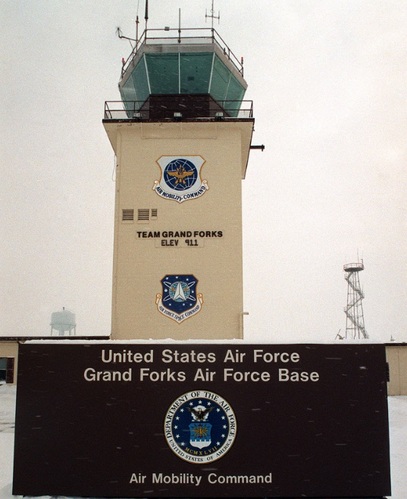
–>
July 22, 2022
The meaning of weiqi, the ancient Chinese game of strategy, is ‘encirclement game.’ But in weiqi it isn’t enough to surround enemy stones to capture ground. It’s vital to have some of your stones within enemy territory. When you then lay siege, swathes of the board fall with no fighting. China’s leaders, strategists, and generals swear by Sun Tzu and weiqi: they combine the lessons of the philosopher’s Art of War with principles of the game to win without fighting, deploying long-term plans and deception, skirmishing on many fronts, and creating outposts hidden in plain sight.
‘); googletag.cmd.push(function () { googletag.display(‘div-gpt-ad-1609268089992-0’); }); }
One such outpost, an agro-industrial plant of China’s Fufeng group, is in the development stages on American soil – in Grand Forks, North Dakota, to be precise. It’s 13 miles from the Grand Forks Air Force Base (GFAFB) and 85 miles from the Cavalier Space Force Station. This is the Great Plains region, so uninterrupted lines of sight make visual and electronic surveillance of the base and station uncomplicated. Given China’s ambition to dominate the world and its ingrained culture of war by deception, it would be naïve to think the plant won’t be used for espionage.
The patriots of Grand Forks, against tremendous resistance from the administration, are campaigning for a referendum against the plant. Some of them have faced intimidating visits from the FBI and police. Hopefully, the rest of America will wake up to their clarion call and thwart this Chinese intelligence bastion disguised as a corn mill. But the question is, how was the Fufeng plant able to avoid closer scrutiny? And why are the authorities bearing down on those opposing what should never have been allowed in the first place?
For decades, China has been growing its front of influence in the U.S., as in other countries, by working at the local level to evade federal concerns with national security and defense. It has found state- and city-level politicians and non-governmental agents vulnerable to inducement and the seduction of economic opportunities in their regions. It has furthered its goals, circumventing unfavorable federal legislation by subverting the subnational system with cultural, school-to-school, business-to-business, and local governmental exchange programs.
‘); googletag.cmd.push(function () { googletag.display(‘div-gpt-ad-1609270365559-0’); }); }
A telling demonstration of this was seen during Xi Jinping’s first visit to the U.S. as general secretary of the Chinese Communist Party (CCP) in 2015. He made appearances at the Obama White House and the U.N., but his high-priority stop was at the China-U.S. Governors Forum in Seattle, where for two days he held focused meetings with state and local government office-holders and business leaders.
Chinese influence in North Dakota dates back more than a decade. In 2010, the state’s then lieutenant governor, Jack Dalrymple, who owned stock in one of the largest national oil companies in China, led a delegation to China to foster education and business deals, including plans for a Confucius Institute at Dickinson State University, ND. In 2012, the university was exposed as a diploma mill that handed out degrees to hundreds of foreign students, mainly from China. An audit uncovered visa violations, false enrollments, fake grades and financial wrongdoing. Security risks can well be imagined.
BEK TV, a news channel in Bismarck, has made a detailed investigation of this process of subnational subversion, tracing its history from the time President Nixon may have opened the door to the Chinese. Its special report, China Conquest, Inside Job, exposes the politics and other circumstances that led to the acquisition of 350 acres of prime farmland near key defense facilities for the Fufeng plant, presenting a microcosmic view of China’s delusive strategy in action. The channel supports citizens’ opposition to this insidious security threat.
The Fufeng Group – it’s nearly impossible to find its net worth online – is a major producer of xanthan gum, fertilizer, starch and sugar substitutes, with five plants in mainland China. Fufeng USA, its American subsidiary, is a global leader in bio-fermentation for animal feed. It has offices in Chicago, and is establishing headquarters in Grand Forks, allegedly for agribusiness.
In June, the Grand Forks City Council approved annexation of property far north of traditional corn country, and a distance from the city, for the $700-million Fufeng corn mill. A CCP-tied development project beyond the cornfields in close proximity to defense bases should have raised suspicion. But city leaders promoted the project as a source of millions in development money and hundreds of new jobs. The site is outside Grand Forks limits, so annexation was necessary for the city to legally provide infrastructure services.
 Citizens feel betrayed about being kept in the dark. Their concerns about espionage and surveillance aren’t exaggerated. The GFAFB hosts the 319th Reconnaissance Wing, which operates RQ-4 Global Hawks (remotely piloted aircraft used for intelligence and surveillance) and supports air mobility, major weapons systems, conventional and nuclear plants, and a group equipped with Minuteman 3 ICBMs. The GFAFB also maintains a global communication network for the air force, so there is considerable potential for sabotage.
Citizens feel betrayed about being kept in the dark. Their concerns about espionage and surveillance aren’t exaggerated. The GFAFB hosts the 319th Reconnaissance Wing, which operates RQ-4 Global Hawks (remotely piloted aircraft used for intelligence and surveillance) and supports air mobility, major weapons systems, conventional and nuclear plants, and a group equipped with Minuteman 3 ICBMs. The GFAFB also maintains a global communication network for the air force, so there is considerable potential for sabotage.
‘); googletag.cmd.push(function () { googletag.display(‘div-gpt-ad-1609268078422-0’); }); } if (publir_show_ads) { document.write(“
Republican Senator Kevin Cramer and Senate Intelligence Committee leaders Marco Rubio (R-FL) and Mark Warner (D-VA) have objected to the project. Top military brass warned the committee that the corn mill presented an excellent opportunity for the Chinese to perform intelligence, signals, and humint collection. In a press interview, Cramer said, “I think we grossly under-appreciate how effective they (China) are at collecting information, collecting data, using it in nefarious ways.” FBI director Christopher Wray, too, warns that Chinese companies are Trojan horses. BEK TV quoted him saying that Chinese companies must comply with CCP policy, and no one gets to a position of wealth and influence in China without bending to the CCP and having its representative(s) on their company board.
A May 26 report of the U.S. China Economic and Security Review Commission raised concerns about China’s investments in America’s Ag sector (over 200,000 acres). It quotes USAF Major Jeremy Fox: “Some of the most sensitive elements of Fufeng’s plan in Grand Forks exist within the digital uplinks and downlinks inherent with unmanned air systems and their interaction with space-based assets.” The report concluded that potential surveillance by the CCP-linked company could damage U.S. strategic advantages.
Citizens contend that defense authorities, the FBI, and base commanders were not contacted about the project and that local media enthusiastically supported Fufeng without revealing the risks. The local newspaper publisher, who played a pivotal role in bringing Fufeng to Grand Forks, sits on the board of the Grand Forks Regional Economic Development Corporation. In fact, the city reached an agreement with Fufeng without public consultation. So citizens drew up a petition demanding a referendum. They gathered close to 5,000 signatures, more than necessary to force a referendum, but the authorities rejected it, saying grassroots drives could not address “administrative matters.”
When Jodi Carlson posted on the Facebook page of the Concerned Citizens of Fufeng Project in Grand Forks that citizens needed to take their city back since the government wasn’t listening, and quoted from the Declaration of Independence for emphasis, she was visited by the FBI and the police, who said her posts were threatening. She noted that ironically, the police had been dismissive of her complaint about an online stalker, saying they wouldn’t intervene in “social media” matters, but were suddenly interested in a post related to her Fufeng activism.
Perhaps to stem the dissent, city leaders are considering a review of the project by the Committee on Foreign Investment in the United States (CFIUS) to evaluate the security implications of the Fufeng deal. It’s strange, though, that CFIUS, mandated to review real estate transactions within 100 miles of designated military installations, did not look at the deal beforehand.
But the patriotic voices from Grand Forks are being heard nationwide, so the Fufeng plant may be forced to go – or submit to stringent scrutiny for security risk. Only an alert – and patriotic – citizenry can save American freedom from the nefarious web of China’s weiqi strategy and its resident front, the American Leftists.
In 2020, President Trump’s Secretary of State Mike Pompeo warned the National Governors Association about the CCP, saying they should “know it’s working you, know it’s working the team around you.” He also warned of CCP’s influence-building at lower levels, and urged vigilance at the local level. If he had been heeded, Fufeng would never have gotten a foothold in North Dakota.
Photo credit: Public domain
<!– if(page_width_onload <= 479) { document.write("
“); googletag.cmd.push(function() { googletag.display(‘div-gpt-ad-1345489840937-4’); }); } –> If you experience technical problems, please write to [email protected]
FOLLOW US ON
<!–
–>
<!– _qoptions={ qacct:”p-9bKF-NgTuSFM6″ }; ![]() –> <!—-> <!– var addthis_share = { email_template: “new_template” } –>
–> <!—-> <!– var addthis_share = { email_template: “new_template” } –>






